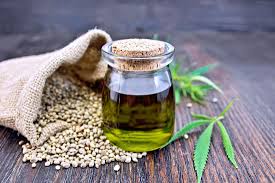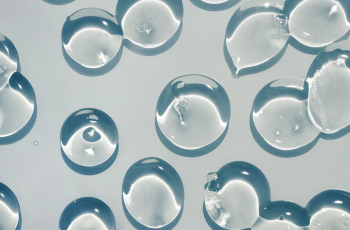
The Science of Hemp Seed Oil in Skincare
As hemp seed oil becomes more popular in skincare products, many people are interested in the potential benefits of hemp seed oil in their skincare routines.
Hemp seed oil contains active ingredients such as essential fatty acids and vitamin E, which have moisturizing, anti-inflammatory, and antioxidant effects.
This article explores the current level of knowledge about hemp seed oil and helps you decide if it’s right for your skin! Click the button below to take the Bowman Skin Type Test now!
What is hemp seed oil?
Hemp seed oil is extracted from the seeds of the cannabis plant, Cannabis sativa. Unlike marijuana, hemp contains very small amounts of THC, the psychoactive compound that causes the “high.”
Hemp seed oil contains virtually no tetrahydrocannabinol (THC). It has been used for centuries in cooking, industrial applications, and even skin care.
With the rise of CBD beauty products in recent years, hemp seed oil has also become popular for its potential skin benefits.
What is hemp seed oil made of?
Hemp seed oil contains a unique profile of fatty acids and plant compounds, including:
Essential fatty acids: Hemp seed oil is rich in polyunsaturated fatty acids, such as linoleic acid (omega-6) and alpha-linolenic acid (omega-3).
Saturated fatty acids, such as palmitic acid and stearic acid, make up only about 10%. When applied topically, these fatty acids can strengthen the skin barrier.
Vitamin E: A powerful antioxidant that protects the skin from damage caused by free radicals and environmental pollution.
Protein and minerals: Hemp seed oil contains small amounts of protein, magnesium, potassium, iron, zinc, and calcium.
Phytocannabinoids: Trace aromatic compounds from the hemp plant, such as cannabidiol (CBD) and tetrahydrocannabinol (THC).
Hemp seed oil contains very low levels of CBD and THC compared to other hemp extracts.
By cold pressing and refining hemp seeds, CBD and THC are almost completely removed. As a result, hemp seed oil does not have psychoactive effects.
Terpenes: Hemp seeds contain terpenes, such as beta-caryophyllene, which have anti-inflammatory and antiseptic properties when applied topically.
Phenolic compounds: Hemp seeds are a source of phenolic antioxidants like ferulic acid and vanillic acid, which can protect the skin from premature aging.
Chlorophyll: Hemp oil contains small amounts of chlorophyll from the seeds, which can have a cleansing and healing effect on the skin.
While hemp seed oil is extracted from the cannabis plant, the refining process almost completely removes THC and CBD.
Fatty acids and vitamin E remain as the main active ingredients, making hemp seed oil potentially beneficial for skin health and appearance.
Benefits of Hemp Seed Oil
Benefits of Hemp Seed Oil in Skin Care
Due to its high content of fatty acids and polyphenols, using hemp seed oil can provide the following benefits to the skin:
Hydrile Skin Moisturization: Unsaturated fatty acids help the skin retain moisture and prevent transepidermal water loss. This helps moisturize dry, flaky skin.
Reduces Acne: The linoleic acid in hemp seed oil has anti-inflammatory properties. Applying hemp seed oil to acne can reduce redness.
Anti-Aging Effects: Antioxidants like vitamin E fight free radicals that cause signs of aging like fine lines and dark spots.
Relieves Skin Disorders: People with psoriasis, eczema, and dermatitis may find hemp seed oil soothes itching, flaking, and rashes.
Improves Skin Barrier: Omega fatty acids strengthen the skin’s protective barrier, retaining moisture and preventing irritation.
Risks and Possible Side Effects of Hemp Seed Oil
Hemp seed oil is safe to use in skin care products and on the face as long as it fits into your skin care routine.
Organizations like the Environmental Working Group (EWG) consider hemp seed oil a safe and sustainable ingredient.
While hemp seed oil is not generally considered an irritant, there are some possible side effects to be aware of:
Allergic Reactions: People who are allergic to cannabis or similar plants may react to topical hemp oil.
Pore Clogs: Hemp seed oil contains very low concentrations of palmitic acid, a comedogenic compound. In cases of extreme acne sensitivity, this ingredient can clog pores.
Most skin types are less prone to acne with hemp seed oil, especially when it is used correctly for skin care.
Spoilage: Hemp oil has a relatively short shelf life. Skin care products lose their effectiveness after their expiration date.
How is CBD oil different from hemp seed oil?
In addition to hemp seed oil, CBD (cannabidiol) oil from hemp is also becoming increasingly popular in the skin care world. Both ingredients come from the hemp plant, but not from the same part.
CBD is extracted from the flowers of the hemp plant, where it interacts with the body’s endocannabinoid system to relieve pain and inflammation.
Hemp seed oil is obtained by pressing the seeds of the hemp plant. The seeds are rich in fatty acids that nourish and moisturize the skin and do not contain CBD or THC.
Organic vs. Non-Organic Hemp Seed Oil
When buying hemp seed oil, you will often come across organically grown products. Organic hemp seed oil is extracted from plants grown without the use of pesticides or chemicals.
While organic hemp seed oil is more expensive, it eliminates the risk of skin irritation caused by chemical residues.
Non-organic hemp seed oil that has been tested to be free of contaminants is still a high-quality option.
Hemp Seed for Different Skin Types
Hemp Seed Oil for Different Skin Types
With its lightweight texture and mild fragrance, hemp seed oil is suitable for most skin types. Some examples of skin types that can benefit from hemp seed oil products:
Dry Skin
Hemp seed oil is a great choice for dry skin. Unsaturated fatty acids strengthen dry skin’s protective barrier, which prevents moisture loss.
They also moisturize the skin without leaving a heavy, greasy feeling. Hemp seed oil can help dry, itchy, and dehydrated skin retain moisture and make it glow.
Oily Skin
As long as you are not particularly acne-prone, hemp seed oil is a safe choice as a moisturizer for oily skin. It contains very low amounts of heavy saturated fatty acids.
If you are extremely acne-prone, you should avoid using most oils in your skincare products unless they are specifically labeled for use in acne treatments.
Plus, the anti-inflammatory ingredients can soothe acne redness while moisturizing the skin without feeling greasy.
Hemp oil can provide a decent amount of moisture to most oily skin types without clogging pores. The linoleic and alpha-linolenic acids it contains can reduce inflammation caused by acne.
Oily skin should be washed off with water and a cleanser after using oily products.
Hemp Seed Oil Fights Skin Aging
Skin Aging
Hemp seed oil is a good ingredient for anti-aging products.
Antioxidants like vitamin E protect mature skin from wrinkle-forming free radicals. It also stimulates collagen production, reducing fine lines and wrinkles.
Like all anti-aging ingredients, hemp seed oil is most effective in fighting wrinkles when combined with other anti-aging ingredients such as peels, retinoids, peptides, and other active ingredients.
Sensitive Skin
Hemp seed oil is minimally irritating to sensitive skin. The soothing fatty acids in the oil strengthen the skin barrier and relieve inflammation.
Hemp oil is particularly good for sensitive skin prone to redness, itching, and other irritations. It is considered a very gentle oil.
Is hemp seed oil right for your skin type?
Are you considering using hemp seed oil for your skin care? Get personalized recommendations for your individual skin needs with the Baumann Skin Type Quiz.
This free quiz analyzes your skin goals, lifestyle factors, and symptoms to determine your personal Baumann skin type.
You’ll receive targeted product recommendations tailored to your skin’s needs. Determine your Baumann skin type today and optimize your skincare routine.


